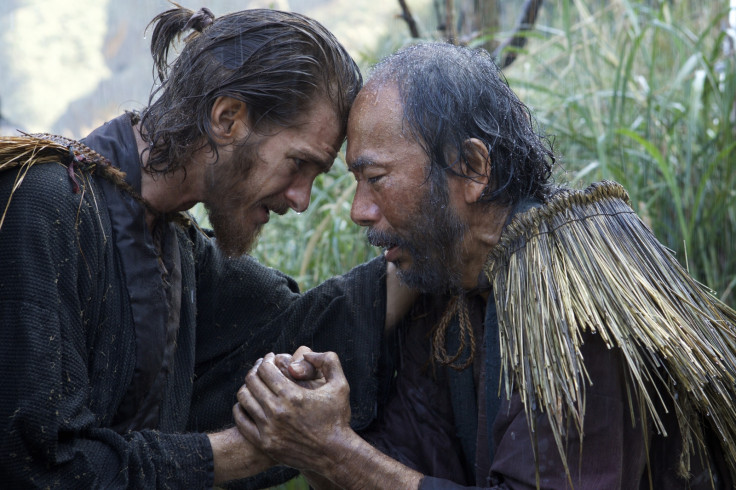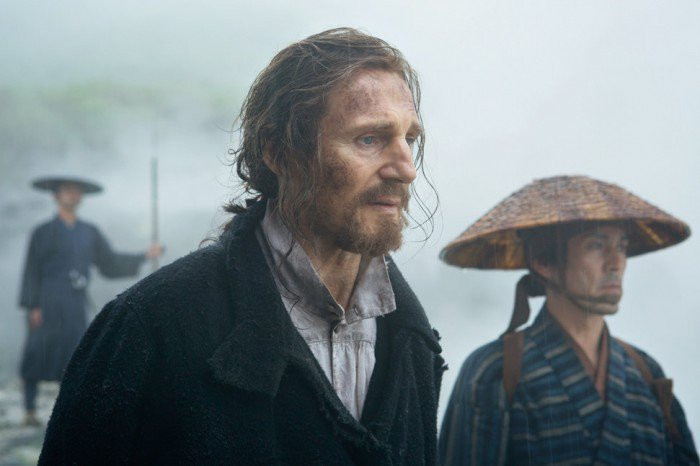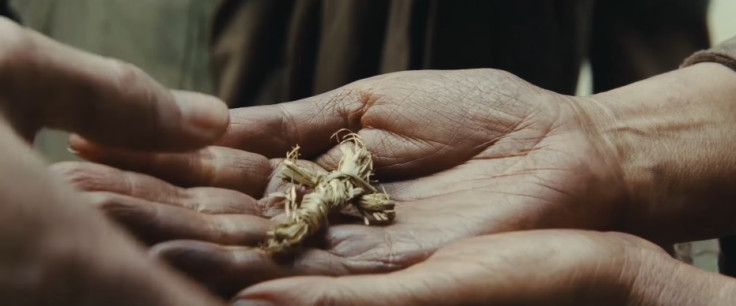Silence review: Career-best performances and technical brilliance shine in hard-hitting drama
Liam Neeson, Adam Driver and Andrew Garfield lead an ensemble cast in Martin Scorsese's passion project.

No stranger to tackling the subject of religion in his work, director Martin Scorsese finds inspiration in Shusaku Endo's novel Silence this time round, adapting it for the big screen in this epic, thought-provoking drama.
Silence follows Sebastião Rodrigues (Andrew Garfield) and Francisco Garrpe (Adam Driver), two 17th Century priests who travel to Japan to find their missing mentor who has supposedly denounced his faith. While there, the pair hope to propagate Catholicism but, shortly after their arrival, they quickly learn the dangers of being a man of God.
In remote villages, Japanese Christians hide their practices, in fear that they'll get found by troops who spend their days trawling landscapes to find people like them. Upon learning the priests are near, communities offer to shelter Rodrigues and Garrpe but their presence in the country causes violent consequence for all who are involved, as they are all forced to question the strength of their faith.
When a film has been directed by Scorsese, everyone sits up and takes notice. This is a film that took Scorsese almost 26 years to make... and if that doesn't have a movie-lover desperate to see it on opening night then what will? But with such a labour of love comes great responsibility and expectations for films like this are exceedingly high.
Fortunately for Scorsese, he's forged himself an impressive team here. If Silence is going to be nominated for, or even win, any accolades come awards season in 2017, it will undoubtedly be in the acting categories. Garfield, in particular, offers up career-best work, guiding the audience through his character's spiritual journey; from a young man full of confidence – quick to deliver an impassioned speech – to a broken one who barely utters a word, eventually becoming a somewhat beautiful yet tragic combination of the two.

There's no denying that Garfield is the strongest player here but supporting actors Driver, Shin'ya Tsukamoto and Neeson also shine when they are on screen. All three have fairly brief roles in the film compared to Garfield, portraying characters arguably seen more as devices to propel Rodrigues' story forward than anything else, yet each of them command the audience's attention.
One of the film's most poignant aspects is that it doesn't shy away from expressing the burden that faith can sometimes bring on its disciples, and it's apparent that each actor puts this at the forefront of their performance. Each one is brave enough to touch upon moments of martyrdom too, which allows Scorsese to examine the downsides of a life determined by religion without condemnation.
Silence is naturally a leitmotif throughout the film, we – like the isolated Rodrigues – don't necessarily feel connected to God. All he sees, and subsequently all we see, is humans enacting wrath and violence from a position of prejudice... So it's heartbreaking to listen to his voice-overs in times of turmoil, saying: "I pray but I am lost. Am I just praying to silence?" Such quiet is emphasised by Kim Allen Kluge and Kathryn Kluge's score too, as the pair often use natural sounds to mirror what is happening on screen, making way for the lack of words to tell the story instead.
Already being hailed as an Oscar contender, it's incredibly easy to see where the film excels technically but while it's cinematography and performances are beyond stunning, its plot ends up being surprisingly lacklustre. While the subject matter and themes are powerful; threads about questioning belief, violent, closed cultures and the will to survive often strike emotional chords but Scorsese and co-writer Jay Cocks' insistence on repeating several scenes, just in slightly different ways.

Multiple times throughout, Rodrigues and other Christians are ordered to stamp on an image of Christ to demonstrate that they do not hold the controversial faith in high regard. Sometimes characters oblige, sometimes they do not. But the more and more times you see it, it does tend to lose major impact along the way. (It doesn't help that the movie is a pretty hefty 159 minutes long).
It's much the same with the overall plot. Tadanobu Asano's Interpreter spends the whole movie trying to force Rodrigues to renounce God. And while there's intrigue as to whether they will break him or not and cause for you to question the Interpreter's morality, it becomes a little tedious. There are visual curve balls thrown in, mind you. Scenes of makeshift crucifixions on harsh rock faces, tortuous rituals carried out in matter-of-fact ways and even a beheading, will shock and stay with you for days after.
While its not necessarily as black and white as that, the priests and Christians featured in Silence can't help but come across as the 'heroes' of the piece. Against all that they face, you root for them and their constant persecution is harrowing to watch. But where there are goodies in a story, there has to be some sort of semblance of hope and – considering how dark the story goes in places – such moments border on hokey. With the very final shot perhaps being the hokiest of any scene seen in a Scorsese movie so far.
Much like Scorsese's last outing which centred on religion and spirituality The Last Temptation Of Christ, Silence will likely prove polarising among cinema-goers. Its undoubtedly thought-provoking which is evidently what this film set out to be but it has some very minor flaws but never-the-less, it's a film that needs to be watched. Even if it is just the once.
© Copyright IBTimes 2025. All rights reserved.






















